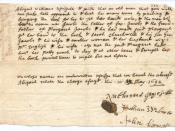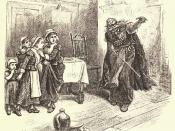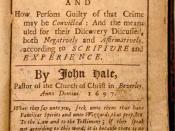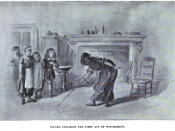Life in the town of Salem is very monotonous and claustrophobic. The only thing people do in the village is work hard all day long and pray as they believe they will go to heaven for their good deeds. However gossip is rampant, in fact it is the biggest turmoil the town relishes in. Gossip creates some light and excitement in the town and is the people's only escape from the seemingly pointless lives they lead. One night, some of the young girls of the village are caught by Parris in the forest, dancing, one of them in the nude, this is definitely not appreciated in town. The following morning Betty, Parris' daughter, does not wake and so mass hysteria and accusations of witchcraft evolve claiming she is possessed by the 'devil'. Someone must be blamed and so it leads to the ending of Act 1 with the girls Abigail and Betty (waking from her supposed coma) yelling out people's names who are guilty of consorting with the devil, the girls do this to save their own skin and for Abigail it is a chance for revenge.
Abigail has a bad name around town. She has had an affair with John Proctor and his wife Elizabeth has soiled her name in revenge for this. Proctor has made up his mind that the affair with Abigail is over and he shows strength of character in refusing her. He has treated her badly. He has abused Abigail's and his wife's trust and taken advantage of Abigail. When found out he got rid of her. She is only behaving naturally, though misguidedly, in wanting him back. When the opportunity arises and she is able to start naming names of supposed witches, Abigail sees the potential for revenge. She takes on the role of repentant sinner, confessing that she has consorted with the devil, but now seeks salvation "I want the light of Godâ¦I want the sweet love of Jesus". She is taking full advantage of the blind ignorance of those around her and she is now relishing in the role of being expert witness to the witchcraft. All of a sudden, Abigail's previously poor reputation has been forgotten. Her manipulating ways has won her a chance to save her skin and blame others for her actions.
The children of Salem are seen as non important within the society. They must abide by the moral code "walk eyes down and not speak unless spoken to" which they truly hate. Life is very meaningless to them as having any sort of recreational fun is frowned upon. The kids must do what they are told and so in time rebellion will grow till the breaking point.
When the accusations of witchcraft occur the kids can not believe their luck. For once in their lives they can talk about their true feelings without being shunned away. They have control of the situation as so many times they have not before. The spotlight is on them now and they love the attention they are given. To make it even more appealing is also a chance to save their skin from punishment. They are no longer the scapegoats and have the power to blame others. Abigail and Betty, in their partly controlled hysteria, start pouring out a string of names for all the pain they have suppressed for so long has been relieved and it is an emotional experience for them.
Hysteria has the power to block out reason. It thwarts those who are trying to argue on a logical basis. It exploits fear and it allows those who have something to hide to lessen any danger to them in the emotional whirlwind. Any notions of good or evil are quashed in fever of noise, superstition and frenzy. Hysteria plays a big part in ensuring that the findings of Salem trials are tragically wrong.
Act 1 ends with mass hysteria, "an excessive, uncontrolled emotional outburst." which is exactly what the girls are doing with their ecstatic crying out. We are looking at an outpouring of feeling that is a combination of wild emotion and fear, with no reason present. The opening of the play sees fear gripping the people of Salem as rumours of the girls dancing in the forest spread around. Parris is worried about these fears of witchcraft and the implications for himself and his family "I must know it now, for surely my enemies will, and they will ruin me with it." The whole atmosphere at this stage is charged with emotion. Mary Warren is very frightened and tells the other girls that witchcraft is a "hangin' error" (pg 26-27).
Abigail has reason to fear accusations of witchcraft because of her adulterous affair with John Proctor. She realizes that when Tituba starts naming people she has seen with the devil she can do the same and divert the blame away from her. Her masterful ability to manipulate people comes into play. Her bitterness has set in and now its time to seek vengeance.
When belief of witchcraft is bought into play, sensible people like John Proctor and Rebecca Nurse leave the scene believing it is a load of nonsense. John hopes that Hale will knock some sense into the situation. The only people left are either foolish or vindictive, or both. Add to that the obvious way in which the wily Abigail is cornered, and the reason for the explosion which follows becomes clear.
As soon as Abigail is in any chance cornered she accused Tituba the slave woman, an easy target. She is also ill-educated and so frightened she will say anything. To save herself Tituba accuses the old women of the village, whose names have been put into her mouth by others. Tituba is also badgered by Parris and Hale into seeking her own salvation. Abigail has accused her of such crimes as making her laugh at prayer, drinking blood and 'dreaming corruptions'. Hale convinces her that she is God's agent 'to help us cleanse our village'. And so, in an outburst, she admits she saw the Devil, and names some of his Salem agents. It is Abigail who orchestrates the hysteria. Claiming she wants 'the light of God', she starts a chant of 'I saw Goody --- with the Devil'. The resurrected Betty joins in. The hysteria that will envelop the court has begun.
It is a scene at once dramatically overpowering and morally disturbing. The truth is that Tituba is making it all up to save her neck, and Abigail and Betty are going along with the pretence for self-serving reasons too. The stupid and vicious Putnam's are indulging their cruel natures, Parris is glad the heat has gone off him, and Hale is enjoying the sense of being the hero of the moment (having exorcised the Devil). Everyone has gone temporarily crazy. Worst still, they have all committed themselves now to a course of action from which they will not be able to retreat.
This scene at the end of Act 1 is crucial, we know now that the whole story will go to the bitter end, the evil that men do is on an unstoppable course.
A retraction for those crying witch would mean frightful punishment, and humiliation would be the lot of the others. To protect themselves, they will now push on with the lie, no matter where it leads, no matter whom it may destroy. That is the real evil that Miller is identifying. The supposed wickedness of being the Devil is a silly fiction. We see through that easily. The true wickedness is in the hearts of these ordinary people, and that the wickedness consists of treating others as expendable objects, forgetting common sense and decency. We misconstrue 'evil', Miller seems to be arguing, thinking of it as 'over there', something exotic and magical - when the worst things happen because of uncontrolled selfishness, which is within us all the time.





